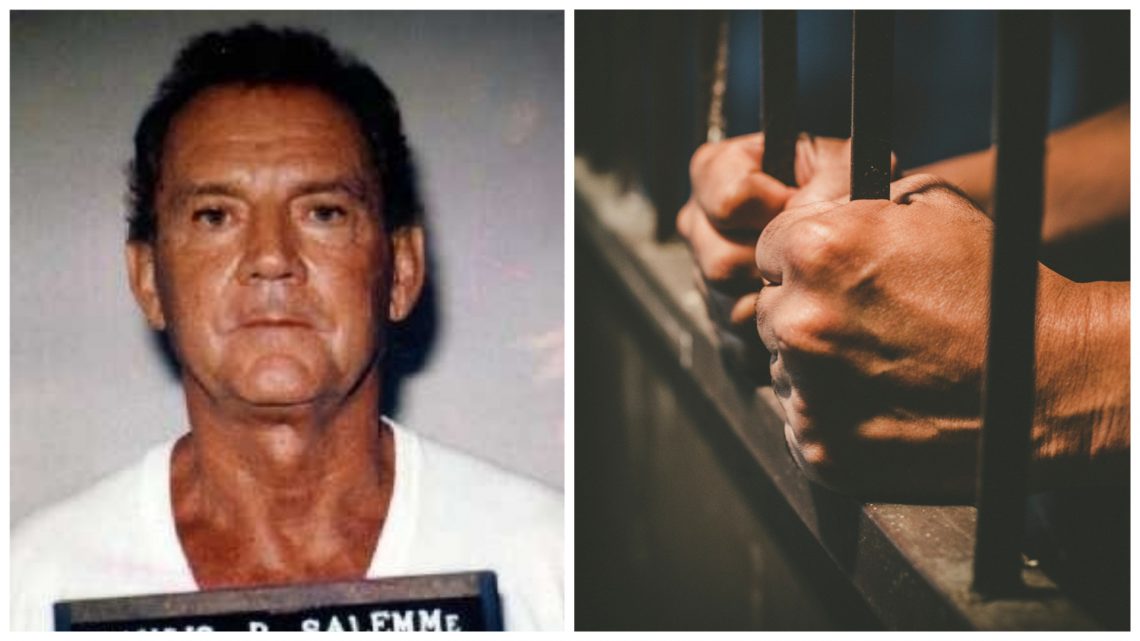
The Mysterious Swan Song of Mafia Killer ‘Cadillac Frank’
September 17, 2018At federal court in Boston Thursday, a geriatric ex-mafia Don hunched over the bench in an orange jumpsuit and shuffled papers, his ears sticking out from his shriveled head like bat wings. But he didn't appear to be listening even as the assembled children of his murder victim, Steven DiSarro, addressed the man they knew as "Cadillac Frank."
"I spent all these years wondering what happened to my father," Nick DiSarro, the victim's youngest son, told the 85-year-old—whose actual name is Francis Salemme—in-between tears. "The questions were the same. Was he alive? Did he leave? Why didn't he take us? Did he suffer?"
The elder DiSarro, a nightclub owner, real estate developer and father of three, went missing in 1993. His wife last saw him getting into a red Jeep. For 23 years, DiSarro’s family didn’t know if he was alive or dead.
His body wasn’t discovered until March 2016, when a Rhode Island man “jammed up” on narcotics charges pointed law enforcement to a body buried near an old mill in Providence.
Salemme and another man named Paul Weadick were both convicted in June of strangling DiSarro and hiding his body with help from Salemme’s late son, Francis Salemme, Jr. The Salemmes had a secret stake in DiSarro’s nightclub, The Channel, and the duo were said to fear their target might become a federal informant. On Thursday, Cadillac Frank Salemme was sentenced to life in prison.
For his part, Nick DiSarro said he got his answers sitting in court day after day, finally gaining a degree of closure on a horrific chapter of his life. “Sadly, he wasn’t alive. Sadly, he did suffer. And sadly, I do think he knew it was coming.”
This trial has been heralded as the end of an era in Boston crime history, too.
After Salemme’s conviction early this summer, US Attorney Andrew Lelling said the case “in some ways ends a long and dark chapter in the history of our city.” That’s because Salemme was friends with some of the Boston mobsters Americans tend to see played in big Hollywood movies, like James “Whitey” Bulger, the head of the Winter Hill gang. But even if the outsized personalities of this criminal underworld are what has penetrated American consciousness, what’s uniquely haunting about these cases is they suggest there was an untouched layer of corruption at the FBI—and systemic problems with federal informants.
For example, after disgraced FBI agent John Connolly tipped Bulger off to a racketeering indictment in 1994, the mobster fled and lived on the lam in Santa Monica for 15 years—before he was dragged to court at age 81 in 2011 and later convicted of 11 murders. Over a decade earlier, Bulger's partner and fellow informant Stephen "The Rifle Man" Flemmi claimed that because they provided the Bureau with intel, the FBI gave both him and Bulger what amounted to a license to kill—a sensational claim Whiter reiterated at his own trial.
Salemme fled around the same time Bulger did in the 90s, but got caught in West Palm Beach, where neighbors said he wallowed away his days feeding ducks. When he found out that Whitey and Flemmi were informants—up until then, Salemme seemed to think they were just paying for intel—he agreed to be a witness against Connolly himself in a trial that took place in 1999.
At the time of his testimony on behalf of federal prosecutors in that case, Salemme was already a confessed murderer who killed at least half a dozen and maimed another in the 1960s, serving about 16 years in prison. After his release in 1998, he was dubbed the head of the New England Mafia, and during an ensuing power struggle was once nearly assassinated in front of an IHOP.
After he testified against the FBI agent Connolly in the 1999 case, the federal government had Cadillac Frank's back. He was released after doing time for racketeering charges in 2003 and got placed in witness protection, living as a free man on the government’s dime.
Witness protection didn’t really suit him though, he told reporter David Boeri shortly afterward. So Salemme came back to Massachusetts, lived in Brookline, and took his lunch at The Busy Bee diner. “This life is so inundated with top echelon informants, that you couldn’t survive a day in it,” he told Boeri, explaining why he wasn’t returning to a life of crime.
“They called me The General behind my back,” Salemme said of his murder rap.
“Because you planned,” nudged Boeri.
“Planned and did them” finished Salemme.
Salemme’s period of retirement and reflection didn’t last long. He was indicted again in 2004, eventually pleading guilty to misleading federal agents in regards to the DiSarro case. Still, no body had been found, so there was no murder trial. He got released in 2009, and was again placed in witness protection, living in Atlanta under the name Richard Parker and joining a New England Patriots fan club.
In 2016, when feds started digging into the Providence mill, Salemme acted like someone who’d been tipped off, fleeing to Connecticut with $28,000 cash. But "Rifle Man" Flemmi—a ten-time murderer an opposing attorney dubbed “the ultimate human cockroach”—emerged to testify against him. He described DiSarro's last moments to the court.
“As I opened the door to walk in, that’s when I saw Frank Salemme, Jr.,” he said. “He had Steve DiSarro on the throat and he was strangling him, and Paul was holding his legs. Frank was to my immediate left of the door.”
“I said to him Frank, I’m leaving, I’ll see you later. And I left immediately,” he added, noting his decision to leave wasn’t about morals—he was worried Salemme was under surveillance.
But in Boston, the details of what mobsters were up to and when is almost never the whole story. The local history of FBI corruption and shady relationships with informants is why, shortly after DiSarro’s body was found, his widow Pamela told the Boston Globe she blamed the Bureau in part for her husband’s death. She said that, before his death, her husband told her FBI agents approached him in the club.
They “wanted him to start ratting, to be a federal witness.” He refused, she claimed. But she argued that by meeting him at a public place, where he worked with the people they wanted him to inform on, they put his life in danger. “They did not protect me and my family,” she told the paper. “They endangered my family by being so blatant with my husband.” (VICE reached out to the FBI for comment but had yet to receive one at the time of publication.)
At sentencing, the DiSarro children were less critical of the feds, thanking prosecutors and law enforcement. But Salemme couldn’t help messing with the family one last time.
“This is ridiculous,” the old man said, standing up and gesturing with his hands for as long as his rickety legs could hold him. “The real story hasn’t been told and it will come out, Mr. [Fred] Wyshak knows it,” he said of the federal prosecutor. “It’s all BS, your honor, believe me. But it will come out, it will come out in time.”
“They haven’t been told the truth,” added the mobster, for the first time referring to the murder victim’s family directly.
Salemme, a fitness buff in his heyday, was then led out of court wearing handcuffs and grin. He jabbed at the air with a frail right fist, looking pleased with himself for getting one last shot in.
Sign up for our newsletter to get the best of VICE delivered to your inbox daily.
Follow Susan Zalkind on Twitter.


